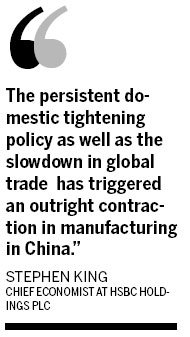Entrepreneurs lose confidence
Updated: 2011-10-14 09:40
By Chen Jia (China Daily)
|
|||||||||||
In Q3, business activity declines to lowest level this year, NBS statistics show
BEIJING - Chinese entrepreneurs have expressed lower confidence in the business climate, amid slowing prospects for economic growth, driven by a cornucopia of tightening measures that some fear will lead to a "hard landing".
That's according to data released by the National Bureau of Statistics on Thursday.
The Business Climate Index indicated that business activity declined to the lowest level of the year, 133.4 in the third quarter, compared with 135.6 in the second quarter and 133.8 in the first.
The reading of the Entrepreneur Confidence Index, a gauge of the country's macroeconomic outlook, slipped to 129.4 in the last quarter, in line with the deteriorating economic environment globally. It was the first decline to a level below 130 in 18 months. The figure for the second quarter was 132.4. The data indicated lowered optimism about business prospects, according to the NBS.
These two indices, which are produced on a quarterly basis by the NBS, are based on surveys of 20,000 companies across a range of sectors. A reading above 100 indicates an improvement in the business climate, while a reading below that signals a deterioration.
| ?
|
Given the impact of the woes afflicting the developed economies, China, in tandem with other emerging economies, may see a continued slowdown as business optimism fell to the lowest level so far this year, he said.
"However, softer growth is proving to be a useful antidote to excessive inflation," said King, who predicted lower year-on-year growth of the consumer price index (CPI) in the fourth quarter. The NBS is scheduled to release September's CPI data on Friday and will publish figures for third-quarter GDP growth on Oct 18. Confidence among real estate entrepreneurs dropped to 99.9 in the third quarter - the lowest among all sectors for the sixth consecutive month - from 107.5 in the April to July period, said the statistics bureau.
The prices of new commercial residential houses were either unchanged or fell in 46 out of 70 major cities during August, compared with 31 in July, according to the NBS.
"The cooling of the real estate market has been a drag on the nation's economic growth. It has also driven small and medium-sized companies that invested in the real estate sector into a dilemma, which has added more pressure to local government finance," said Tang Yunfei, chief analyst with the Beijing-based Founder Securities Co Ltd.
Despite the less optimistic prospects, it is unlikely that policymakers will ease the tightening measures unless the ongoing European debt crisis deteriorates further and seriously hurts export orders from China, Tang said.
Peng Wensheng, chief economist with China International Capital Corp Ltd, said that an easing of monetary policy depends on the solutions for the ongoing global economic risks. He thought it unlikely that there would be an interest-rate hike in October.
"Some directional loosening policies may be implemented to support the financing of small companies and the construction of affordable housing," said Peng.














